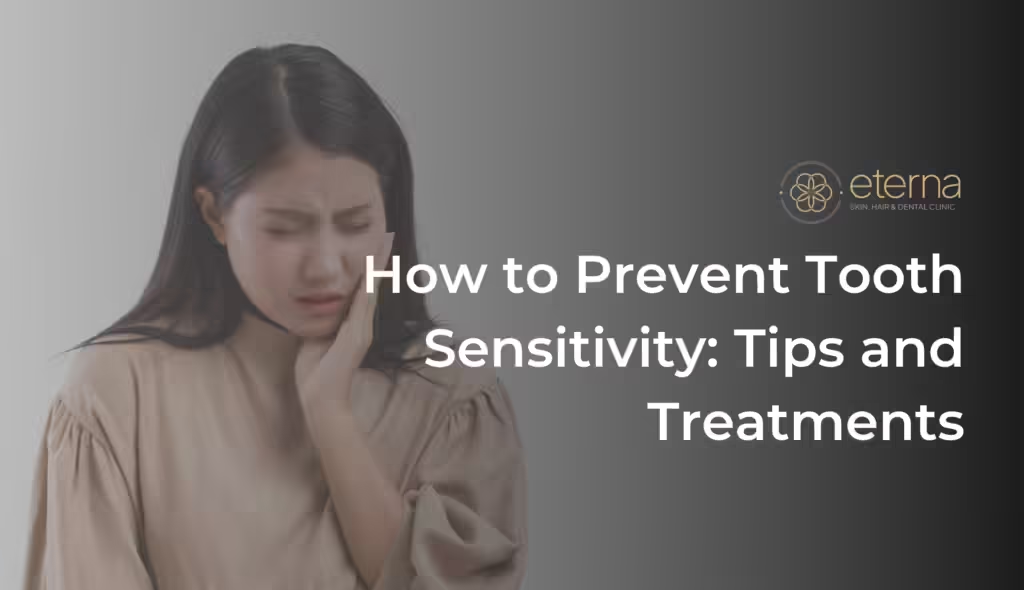Have you ever winced after a sip of cold water or a spoonful of ice cream or even water? If so, you’re likely experiencing tooth sensitivity a common dental issue that affects millions of people. Tooth sensitivity is a common dental complaint but the good news is, it’s both preventable and treatable.
In this blog, we’ll look into what causes tooth sensitivity, how to prevent it, and discuss treatment options available to help you from this problem..
Understanding Tooth Sensitivity
Tooth sensitivity, or dentin hypersensitivity, occurs when the protective enamel layer wears off and the inner layer of the tooth called dentin gets exposed. Dentin is protected by the enamel (on the crown of the tooth) and cementum (on the root). There are microscopic tubules inside the dentin which allow external stimuli like cold, heat, or acidity to reach the tooth’s nerve endings, resulting in sharp, sudden pain. This becomes pronounced when these protective layers are worn off and the dentin is exposed.
Common Symptoms
● Pain when consuming hot, cold, sweet, or acidic foods and beverages
● Discomfort during brushing or flossing
● Sensitivity while breathing in cold air
● Occasional sharp pain without any apparent trigger
Why Does Tooth Sensitivity Happen?
There are several factors that contribute to the erosion of enamel or exposure of the tooth root. Some of the most common causes include:
1. Brushing Too Hard
Using a hard-bristled toothbrush or brushing with excessive pressure can wear off the enamel and cause the gums to be pushed away from the teeth, exposing sensitive root areas.
2. Gum Recession
Often linked to gum disease or aggressive brushing, gum recession reveals the tooth root, which lacks the protective enamel layer.
3. Tooth Grinding (Bruxism)
Habitual grinding or clenching of teeth especially during sleep can wear down enamel over time and cause microcracks and exposure of dentin.
4. Acidic Foods and Beverages
Regular intake of citrus fruits, carbonated drinks, vinegar-based foods, and wine can slowly erode enamel.
5. Dental Erosion or Cavities
Tooth decay and eroded fillings can expose dentin or nerves, making teeth sensitive.
6. Post-Dental Treatments
Sensitivity may temporarily occur after procedures like teeth whitening, fillings, or crowns.
Also Read : Preventing Tooth Decay in Children: A Complete Guide
How to Prevent Tooth Sensitivity
The best way to deal with sensitivity is to prevent it before it starts. With consistent oral hygiene and a few lifestyle tweaks, you can significantly reduce your chances of developing sensitive teeth.
1. Brush Gently with a Soft-Bristled Toothbrush
Brushing too hard does more harm than good. Use a soft-bristled or medium toothbrush and hold it at a 45-degree angle to your gums. Use gentle, circular motions rather than harsh back-and-forth strokes.
2. Use a Desensitizing Toothpaste
Toothpastes specially formulated for sensitivity contain ingredients like potassium nitrate or stannous fluoride that help block pain signals from reaching the tooth nerve. Use them consistently for at least 2–4 weeks to notice improvement.
3. Rinse After Acidic Foods
Acidic foods and beverages can soften enamel temporarily. After consuming them, wait 30 minutes before brushing and rinse your mouth with plain water to neutralize the acids.
4. Floss Daily
Flossing removes plaque and food debris from between the teeth and below the gum line. Healthy gums are crucial to keeping the tooth root protected and reducing the risk of sensitivity.
5. Limit Acidic and Sugary Intake
Minimize frequent snacking on citrus fruits, pickles, sodas, and sweets. These can contribute to enamel erosion and decay.
6. Wear a Night Guard
If you grind your teeth at night, wearing a custom-made night guard can protect your enamel and reduce pressure on teeth.
7. Regular Dental Checkups
Visit your dentist every six months for a checkup and professional cleaning. We can identify early signs of enamel erosion, gum disease, or decay and treat them before they worsen.
Treatments for Tooth Sensitivity
If you’re already experiencing discomfort despite preventive care, don’t worry—there are effective treatments to help manage and even reverse sensitivity.
1. Desensitizing Toothpaste
Over-the-counter desensitizing toothpastes are often the first line of defense. They help block transmission of sensation from the tooth surface to the nerve.
2. Fluoride Application
In-office fluoride varnishes or gels strengthen enamel and reduce pain by decreasing dentin permeability. These treatments are quick, painless, and can be repeated periodically.
3. Bonding Agents
For more severe sensitivity caused by exposed root surfaces or enamel wear, your dentist may apply bonding resin to cover the exposed area and protect the tooth.
4. Gum Grafting
In cases of advanced gum recession, a minor surgical procedure called gum grafting can cover exposed roots and restore the gum line.
5. Dental Restorations
If your sensitivity is due to a cracked tooth, worn filling, or cavity, your dentist may recommend restorative treatments like fillings, onlays, or crowns.
6. Root Canal Treatment
In rare cases where the tooth’s nerve is affected and the pain is severe, a root canal may be necessary. This removes the nerve, eliminating pain while preserving the tooth.
Also Read : Tips for Maintaining Healthy Teeth and Gums
When to See a Dentist
Tooth sensitivity that lasts more than a few days, gets progressively worse, or interferes with eating and drinking should be evaluated by a dentist. Sensitivity can sometimes signal a deeper issue, like decay or infection, that needs prompt treatment.
Conclusion
Tooth sensitivity can be annoying and painful but it doesn’t have to be permanent. With proper care, small lifestyle adjustments, and professional help when needed, you can protect your enamel, maintain healthy gums, and enjoy your favourite foods without discomfort. Follow these simple tips and your teeth will thank you.
At Eterna , we’re dedicated to providing top-level dental care that makes us the best dental clinic in Calicut. Whether you need a routine checkup, cosmetic enhancements, or advanced dental treatments, our expert team is here to ensure your smile is in the best hands. We are also the best skin clinic in calicut and best hair clinic in calicut.
Call us at +91 7770009268 or visit our clinic to experience the difference.

